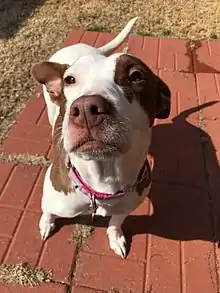DoggoLingo
DoggoLingo[note 1] is an Internet language that is created from word conversion, meme lexicon, and onomatopoeia. Emerging in the 2010s,[1] DoggoLingo is implied to be a dog's own idiom, and is presented as what humans have long believed goes on in the canine brain. Elyse Graham, assistant professor at Stony Brook University, describes DoggoLingo as "upbeat, joyful, and clueless in a relentlessly friendly way".[2]

Structure
DoggoLingo appends various diminutive suffixes "-o", "-er", "-ino" to existing English words (e.g. dog turns into doggo,[3] pup turns into pupper[4]) as well as DoggoLingo words that have been created (e.g. pupper turns into pupperino, bork turns into borker).[1] DoggoLingo relies heavily upon onomatopoeia: Words such as blep, blop, and mlem[5] describe the action of a dog sticking out its tongue, or other forms of facial expression; bork, boof, woof describe the various canine barking sounds. A dog with a fluffy coat may be called a floof or a fluff. DoggoLingo follows a similar rudimentary style to create its verbs (e.g. doin me a in place of present participles with the speaker as object, such as doin me a scare "scaring me") and adjectives (e.g. heckin in place of degree modifiers such as extremely). 'Heck' is frequently used in place of more conventional expletives. Some words also come from eye dialect spellings of English words, such as fren "friend".[6]
Origin
DoggoLingo emerged in the 2010s,[1] but its exact origin is unknown. Various social media accounts such as WeRateDogs on Twitter and Dogspotting on Facebook, as well as social news aggregation and imageboard websites like 4chan, Reddit, or Tumblr have aided in popularizing the use of DoggoLingo by consistently using or hosting content that uses the lingo on their Internet pages. In 2014, the Dogspotting Facebook account gained popularity, especially in Australia where, coincidentally, adding "-o" to the end of words is also a feature of Australian slang.[3] Usage of DoggoLingo peaked around 2017.[1]
Linguist Gretchen McCulloch characterized the language as "taking on characteristics of how people would address their animals in the first place", and noted that it was used by people talking as themselves online, in contrast to the mid-2000s lolcat trend where images of cats were captioned as if the cat were speaking.[3]
Examples
| Lingo word | Base word | Meaning |
|---|---|---|
| blep or mlem | — | Onomatopoeic term for action of an animal sticking out its tongue.[7][3] |
| boop | — | The act of lightly and gently tapping something, such as a dog's nose. |
| bork or boof | bark/woof | Term for the verb "bark", commonly used in memes.[8] |
| doggo | dog | An affectionate term for dogs.[8] |
| fren | friend | A word for friend, commonly used to illustrate the dog's point of view towards its owner or other dogs.[9] In 2023, an analyst from the Southern Poverty Law Center noted the term having been adopted as a deliberately "innocuous" and "baby talk" self-description by the far-right online, with the word being used as a backronym for "far-right ethnonationalist".[10] |
| henlo | hello | An affectionate way of saying "hello".[11] |
| hooman | human | An affectionate way of addressing humans, e.g, "My hooman is my best fren!" |
| pupper or pupperino | puppy | An affectionate word for puppies.[8] |
| woofer, floofer or boofer | woof | A word for a very big dog, used affectionately.[8] |
Other animals
Many other animals are referred to differently in DoggoLingo: for example, one would refer to a snake as snek or danger noodle,[12][13] a human as hooman,[14][15] a cat as catto (cf. doggo), a bird as birb,[13] and a bee as a spicy sky raisin.
See also
- Balltze (aka Cheems)
- Doge (meme)
- Hypocorism
- Pig Latin
References
Note
- also referred to as doggo, doggotalk, woof, bork, and dog-speak
Citations
- "What Does doggo Mean?". Everything After Z by Dictionary.com. Retrieved 2020-04-10.
- "The weird underside of DoggoLingo - OxfordWords blog". OxfordWords blog. 2017-08-01. Archived from the original on 2019-04-02. Retrieved 2018-02-26.
- Boddy, Jessica (April 23, 2017). "Dogs Are Doggos: An Internet Language Built Around Love For The Puppers". NPR. Retrieved October 3, 2021.
- "PUPPER (noun) definition and synonyms". Macmillan Dictionary. Retrieved 2020-04-10.
- "What Does mlem Mean?". Everything After Z by Dictionary.com. Retrieved 2020-04-10.
- Golbeck, Jennifer; Buntain, Cody. "This Paper is About Lexical Propagation on Twitter. H*ckin Smart. 12/10. Would Accept!". 2018 IEEE/ACM International Conference on Advances in Social Networks Analysis and Mining (ASONAM).
- "blep". Dictionary.com. Retrieved December 18, 2020.
- Boddy, Jessica (23 April 2017). "Dogs Are Doggos: An Internet Language Built Around Love For The Puppers". NPR. Retrieved 2 August 2022.
- Wordsworth, Dot. "Doggo lingo". www.spectator.co.uk. Retrieved 2 August 2022.
- Tangalakis-Lippert, Katherine. "Elon Musk pulled Twitter from the EU's anti-disinformation agreement and continues to troll with alt-right memes and dogwhistles. It could be a sign he'll close the site to Europe completely". Business Insider. Retrieved 11 June 2023.
- Iseli, Marcel (6 October 2020). ""Henlo": Here's What It Really Means and Where It Comes From". Linguablog. Retrieved 1 June 2021.
- "What Does snek Mean?". Dictionary.com. 27 June 2018. Retrieved April 10, 2020.
- Elbein, Asher (December 12, 2019). "When Is a Bird a 'Birb'? An Extremely Important Guide". Audubon. Retrieved October 8, 2022.
- Hannen, Missy (January 16, 2018). "Dogs remind us to be hooman". Vanguard. Retrieved October 8, 2022.
- Mishra, Shubhi (June 22, 2022). "Adorable video of a doggo waiting for his little hooman at bus stop goes viral. Watch". India Today. Retrieved October 8, 2022.